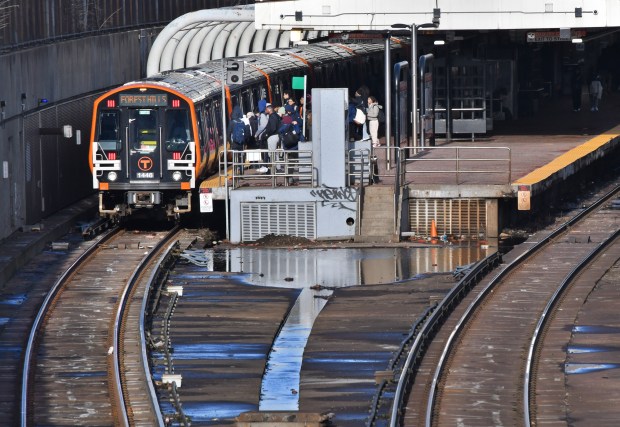Boston Chamber of Commerce President CEO Jim Rooney said he is not opposed to a new tax or fee to boost funding at the MBTA, but cautioned that past attempts to shuttle broad-based taxes to the transit agency did not work out as expected.
Rooney is part of a soon-to-meet group convened by Gov. Maura Healey to explore long-term funding solutions for transportation across Massachusetts, including the MBTA, and create a “sustainable transportation finance plan” at the end of their one-year tenure.
A former MBTA employee who ended his career at the agency as deputy general manager, Rooney said other states have looked to new taxes, including Minnesota, which in 2023 approved a 0.75% sales and use tax to support both housing and transportation initiatives.
“I’m not predisposed to a new tax. I think that the genesis of that is that some other jurisdictions have sort of gone in that direction,” he told the Herald this week. “Broad-based taxes either have not been part of the equation in Massachusetts, or when they were, for example, the sales tax that was dedicated to the T back in the 90s, it failed miserably.”
The MBTA received a dedicated portion of the sales tax in 2000 — along with over $3 billion worth of state debt — under legislation dubbed “Forward Funding” after the tax grew at an average rate of 6.5% a year between 1990 and 200.
But in the years after, the sales tax growth slowed down, and the funding stream did not provide a boon to the agency as lawmakers expected, according to a 2009 analysis from the MBTA Advisory Board.
Transportation Committee Co-Chair Rep. William Straus, who will also serve as a member of Healey’s Transportation Funding Task Force, said the sales tax commitment to the MBTA “still represents a solid foundation to their budget” of about $1 billion a year.
The sales tax and other “funding supplements” to the transit agency’s budget represent 80% the price of a ticket, with the rest paid at the farebox, he said.
“The fact that sales tax growth after 2000 did not meet projections does not mean the financing legislation was a mistake. In fact, that fixed revenue stream allows the T to receive more competitive and lower borrowing rates when it sells bonds for financing projects,” Straus said in a statement to the Herald.
The MBTA faces significant financial challenges in the years ahead. The agency’s budget gap could grow to $652 million in fiscal year 2025 and up to $1 billion by fiscal year 2029, agency budget writers forecasted last month.
An aggressive hiring push, safety and service investments mandated in part by the federal directives, and low post-pandemic ridership numbers all contributed to the financial strain.
Healey earlier this week did not rule out the idea of a new or increased tax to help the MBTA but said she wanted to “wait to see what the task force comes to me with in terms of recommendations.”
“I’m not going to comment on hypotheticals until I see things, but what I’ll say is I think as governor, I have not been afraid to take this head on,” she said when asked about a a new or increased tax. “This administration is not going to be about kicking the can down the road, which frankly is what has happened for far too long. Years, years, decades, right? It’s why we’re in the hole that we have been in that we’re digging out of.”
The governor shuttled an extra $127 million to the MBTA in her fiscal year 2025 budget proposal and handed the agency $45 million to put in place a reduced-fare program.
She also proposed using money generated by a 4% surtax on incomes over $1 million, known as the “Fair Share Amendment” or “Millionaires Tax” to increase the agency’s borrowing capacity by $1.1 billion over five years.
Massachusetts Taxpayers Foundation President Doug Howgate said the surtax is part of the conversation for long term transportation funding, including at the MBTA. But both there is still “a significant need” for the agency and transportation initiatives across the state.
“In discussions 10 and 15, and 20 years ago, certainly a lot of the conversation would focus on the gas tax,” he said. “But obviously, a lot of those conversations have changed now in terms of the fact that we’re gonna have more and more electric cars.”
The expectation that revenue generated from the state’s gas tax will decline as drivers rely less on gas powered vehicles is also putting pressure on the transportation funding conversation. Hundreds of millions are shuttled to transportation initiatives through the gas tax.
Transportation Committee Co-Chair Sen. Brendan Crighton said Massachusetts needs to “have a more modern structure for a more modern revenue source” as the gas tax fades out.
“(A source) that’s certainly equitable, both in terms of income levels, and also in terms of geography. So I think having this conversation is really the responsible way to go about it, doing the work,” he said of the transportation funding task force.







